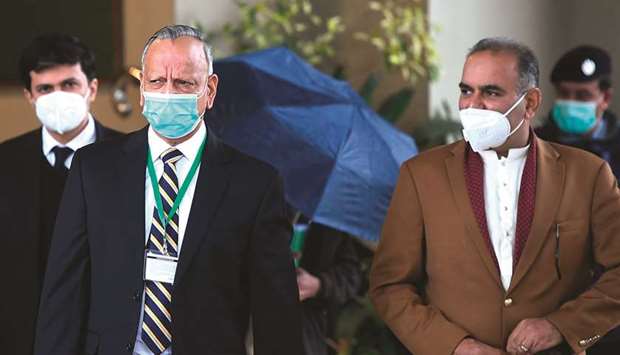Supreme Court has directed Khyber Pakhtunkhwa (KP) government to rebuild the recently vandalised Hindu religious site in Teri in Karak district within two weeks by recovering the amount from Maulvi Sharif — one of the prime suspect behind the demolishing.
A three-member bench headed by Chief Justice of Pakistan Gulzar Ahmed and comprising Justice Ijazul Ahsan and Justice Munib Akhtar heard a suo motu case pertaining to the demolishing of a Hindu saint’s shrine in Karak district of Khyber Pakhtunkhwa.
The bench also ordered authorities to remove encroachments and illegal construction on temple and gurdwara lands and adjourned the hearing for an indefinite period.
During the hearing, the bench was angered by the KP Police’s failure to protect the temple. Justice Ahsan questioned how the incident could occur with a police picket so close by. “What was your intelligence agency doing when the mob was gathering?”
To this, KP Inspector-General Dr Sanaullah Abbasi said 92 police officials who were on duty, including the area’s superintendent and deputy superintendent, have been suspended and at least 109 suspects have been arrested.
He felt the police officers showed “cowardice and negligence” in failing to confront a mob that attacked and set fire to the temple.
Around 1,500 Muslims last week descended on the temple — in a remote village of northeast Khyber Pakhtunkhwa province — after protesting against renovations being made to an adjoining building owned by a Hindu group.
“There were 92 police officials at the spot, but they showed cowardice and negligence,” Abbasi admitted.
Around 12 police officials have been suspended, Abbasi told reporters outside the court.
He informed the apex court that the Jamiat-e-Ulema-Pakistan had called a gathering at the site, adding it was backed by Maulana Faizullah. He said six religious scholars were present but only Maulvi Sharif had incited the mob to attack the Hindu temple.
The top judge remarked that suspending police officials was not enough. “This incident has shown Pakistan in a negative light worldwide,” he observed. Justice Ahsan added to the chief justice’s observation by adding that photos and videos of the incident have gone viral on social media.
KP Chief Secretary Dr Kazim Niaz informed the bench that the provincial government would be rebuilding the temple and bear the cost of construction.
The top judge responded that the cost should be recovered from those who demolished it and directed the KP government to recover the amount from Maulvi Sharif. “Unless they have to personally bear the cost of the rebuilding, they would continue carrying out such acts.”
Shoaib Suddle, chairman of the judicial commission on minority rights, informed the bench that the shrine of the Hindu saint was as revered a religious site for the Hindus as Kartarpur Gurdwara is for the Sikh community.
Agreeing with the apex court’s observation that the incident has created a negative image of Pakistan, Suddle said the Evacuee Trust Property Board (ETPB) had failed to protect the temple.
In its defence, the ETPB said the temple was run by the local Hindu community.
Justice Ahsan asked about the annual number of visitors. “There used to be a carnival as well,” he remarked. “Indeed, a carnival is held at the temple every year,” replied Dr Ramesh Kumar, lawmaker and founder of the Pakistan Hindu Council. “I think about 300 to 400 people visit the temple every month.”
Dr Kumar informed the bench that the main suspect, Maulvi Sharif, had attempted to demolish the temple in 1997 as well. “Despite SC directives, the KP government and ETPB did not rebuild the temple. The council issued funds for the reconstruction,” he said, lamenting about “rampant corruption” in the board.
Justice Ahsan remarked that the board has funds to build its buildings but not for the Hindu community.
After hearing arguments, the top court has sought a detailed report from ETPB on temples and gurdwaras across the country and directed it to consult the judicial commission on minority rights on abandoned waqf properties.
The top court, in an unprecedented move, has also ordered authorities to submit a separate report on the attack.
While no Hindus live in the area, devotees often visit the temple and its shrine to pay homage to the Hindu saint Shri Param Hans Ji Mahaaraj, who died there before the 1947 partition of India that gave birth to Pakistan. It is the fourth holiest Hindu worship site in the country.

Shoaib Suddle (second left), member of the one-man Commission for Minorities Rights, leaves with member of parliament Ramesh Kumar (right) after the Supreme Court hearing in Islamabad yesterday. (AFP)
